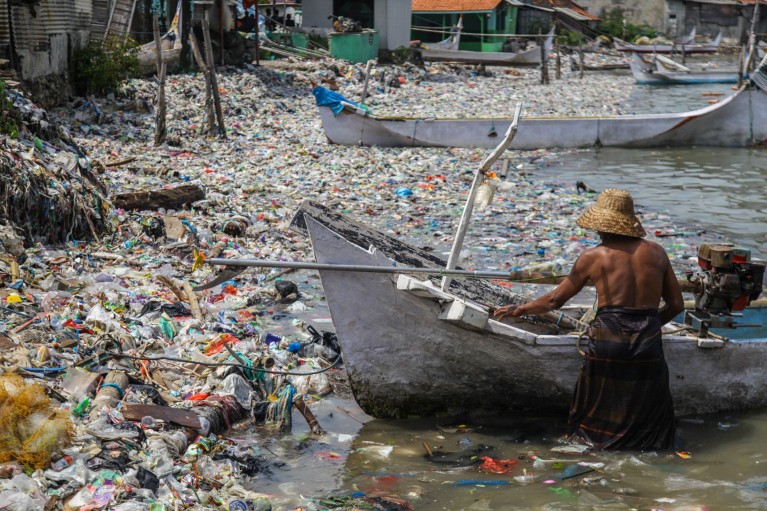2011 (1)
2016 (1035)
2017 (752)
2018 (978)
2019 (385)
2020 (175)
2021 (235)
2022 (101)
2023 (983)
2024 (800)
2025 (537)
2026 (2)

人類禁止將塑料袋用於食品的一個關鍵主題圍繞著塑料垃圾所隱藏的微生物危害。正如2024年10月關於“塑圈”中有害微生物繁殖的評論所強調的——“塑圈”指的是在塑料表麵形成的微生物群落——越來越多的人擔憂塑料垃圾不僅是環境汙染物,還是公共健康威脅。
塑料為病原病毒、抗生素耐藥細菌和其他有害微生物提供了理想的生存表麵。當塑料暴露在環境中,特別是在降解成微塑料的條件下,它們會吸引並滋生危險的病原體。這些微生物可以在生態係統中持續存在並傳播,可能會汙染食品和水源。因此,這引發了一個關鍵問題:塑料的使用,特別是在與食品直接接觸時,可能會帶來健康風險。
因此,禁止塑料袋用於食品可以被視為一種預防措施,以減少食品被病原微生物汙染的風險。隨著我們對塑料汙染所帶來的風險認識的加深,塑料的生物危害性質變得越來越明顯,這進一步強調了轉向更安全、更可持續替代品的緊迫性,以保護人類健康和環境。
H/t: What harmful microbes are lurking in the world’s 7 billion tonnes of plastic waste?
A fisher in Bangkalan, Indonesia, docks at a beach strewn with plastic waste. Credit: Suryanto Suryanto/Anadolu/Getty
-
What harmful microbes are lurking in the world’s 7 billion tonnes of plastic waste?
Pathogenic viruses and antibiotic-resistant bacteria thrive on plastic. The biohazard risks of this ‘plastisphere’ shouldn’t be overlooked in efforts to tackle the pollution crisis.
In June, more than 2,000 volunteers participated in the 2024 Global Ocean Cleanup campaign and netted nearly 40 tonnes of plastic debris from just some 80 kilometres of ocean and coasts across the world, including sites from Vietnam to California. Although representing one week’s hard work for the volunteers, such initiatives are a drop in the ocean of plastic waste that is generated each year — about 400 million tonnes, equivalent to the weight of all adult humans currently on Earth.



